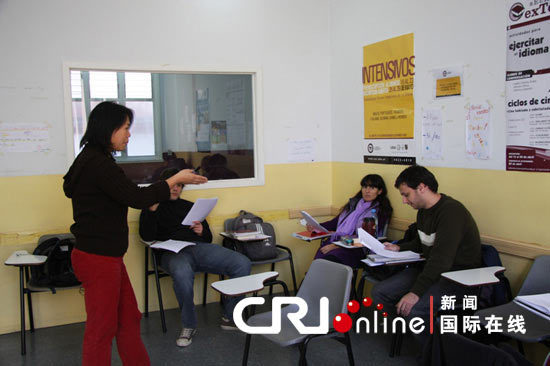Argentina is experiencing a boom among young Argentines and professionals who are interested in learning Chinese language, for both cultural and commercial reasons.
 |
|
In this file photo Argentina students learn Chinese in the Confucius Institute of the University of Buenos Aires. Argentina is experiencing a boom among young Argentines and professionals who are interested in learning Chinese language, for both cultural and commercial reasons. |
The growth in interest has been so impressive in the last year that experts now talk about "a constant increase" in the number of Chinese language students in Argentina, representatives, teachers and students of Chinese language schools told Xinhua in interviews on Wednesday.
"In 2005, we began with expectation of 100 students and now we have 900," said Pablo Cullinan, director of the Students Department at the University Center of Languages and also the co-director of the Confucius Institute, which teaches Chinese language and culture.
"The boom of the Chinese language teaching began in 2004, after the strategic agreement on understanding was signed by Chinese President Hu Jintao and former Argentinian President Nestor Kirchner," said Cullinan.
China's growing global importance has been a "determining factor" when new students decide to roll into language classes, they said.
Argentina is home to two campuses of the the Confucius Institute, one located in the capital of Buenos Aires and the other in the southern city of Mar de La Plata. But private schools offering Chinese lessons have also mushroomed across the South American country.
Some of these new schools include the Argentine-Chinese Chamber of Production, Industry and Trade, the Chinese Argentine School, and the Asia and Argentina Institution.
"In the last two years the interest in the Chinese language is constant and firm, without depending on daily news. It's a genuine interest expressed by young people, university students, professionals and also adults," said Cullinan.
He said the Confucius Institute now has 760 students, an increase of 13percent compared to the same period in 2010. He attributed the rise to many people wanting Chinese language as a second language because they believe there is an advantage for those people who speak Chinese.
Joaquin Garcia, representative of the Chinese Argentine School, which has offered Chinese language lessons since 2003, said the school now has about 100 students, an increase of between 20 and 25 percent from last year.
"The profile of our students are professionals between 20 an 40 years of age who come from the foreign trade sector, like importers and customs officials and who want to learn for work reasons," Garcia said.
Sol Heredia, director of Cultural and Academic Management of the Asia and Argentina Institution, meanwhile said that Chinese language "has been established as an option" for professionals.
"It is not fashion or something temporary, that's why it is not rare to find people who study the language and that is due to the importance of the country, to its power and growth. China is an economic giant and to speak its language is a useful tool," Heredia said.
According to Chinese professor Zhang Jingnan, "to teach Chinese is a challenge. The most difficult part is the pronunciation, to be able to make the different tones when speaking and from there to know the different meanings."
The goal in Argentina is to "each time have more people speaking Chinese and within some years train experts in Chinese language. That is the commitment," said Cullinan.
(China.org.cn, Xinhua News Agency May 19, 2011)